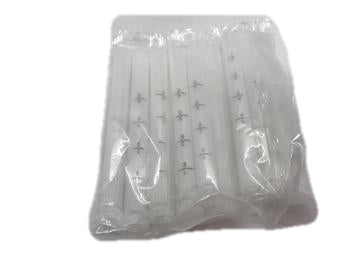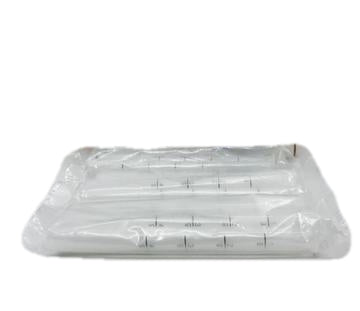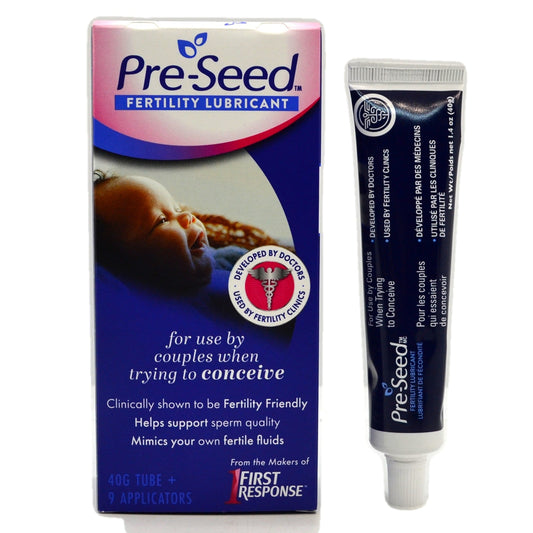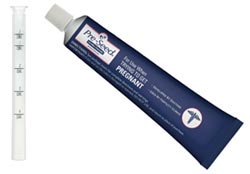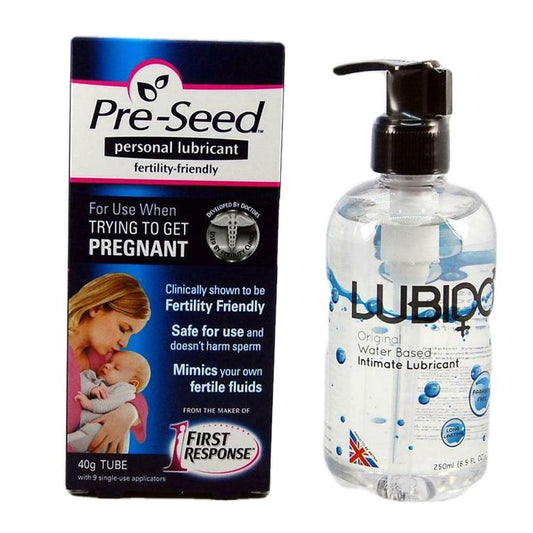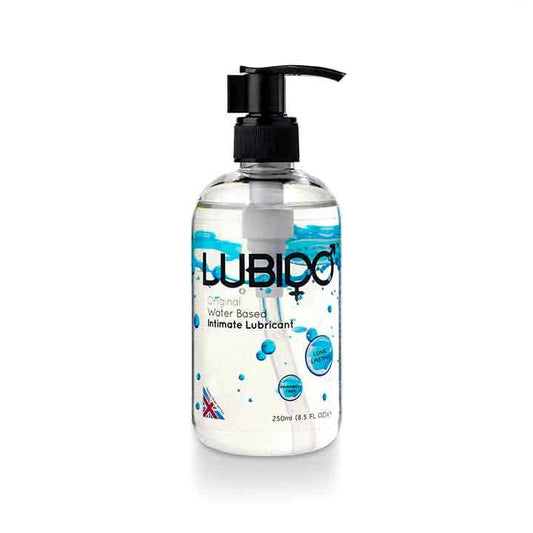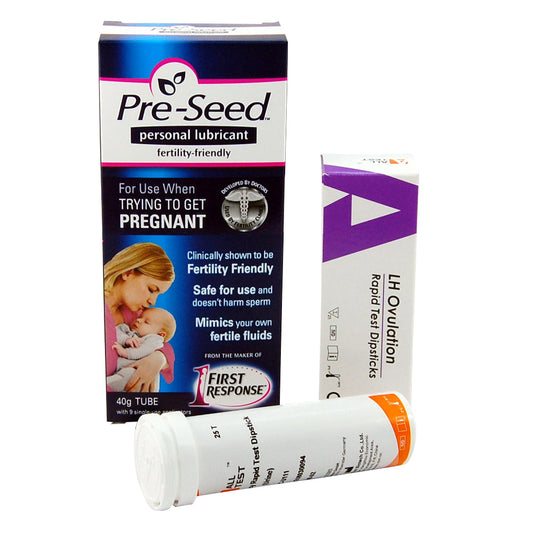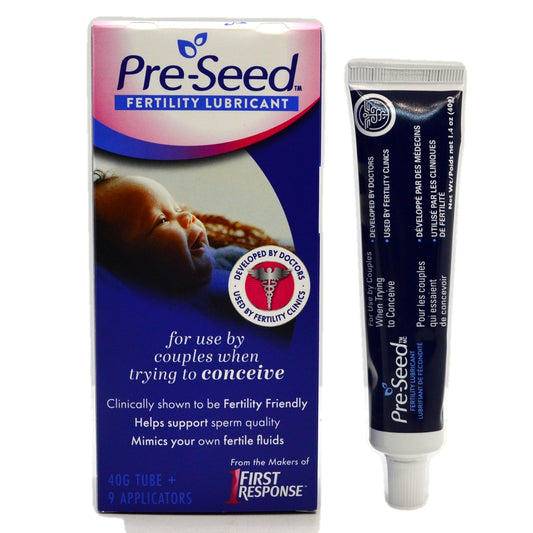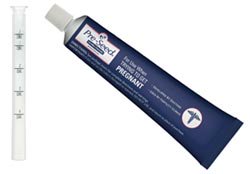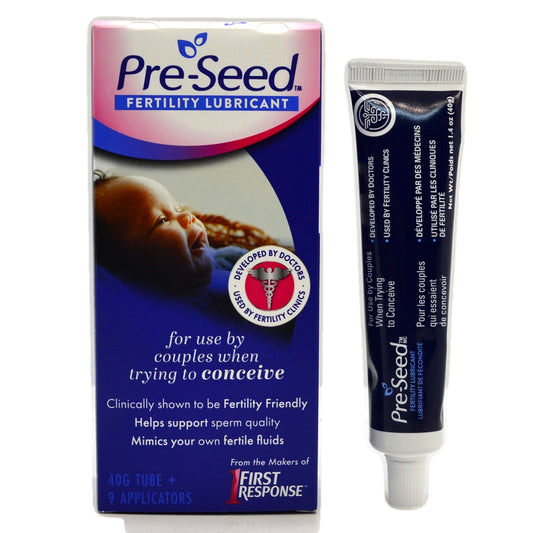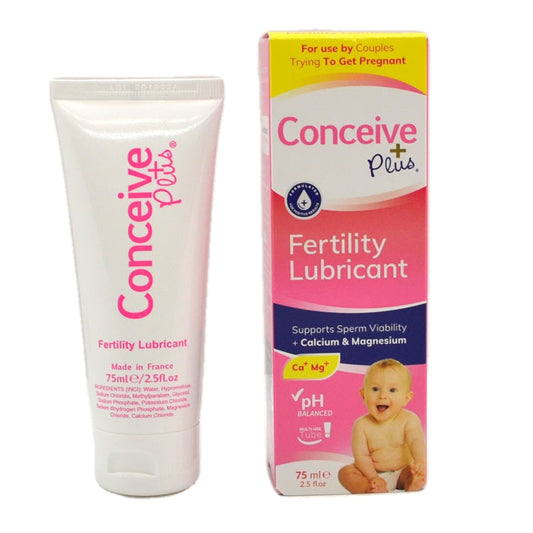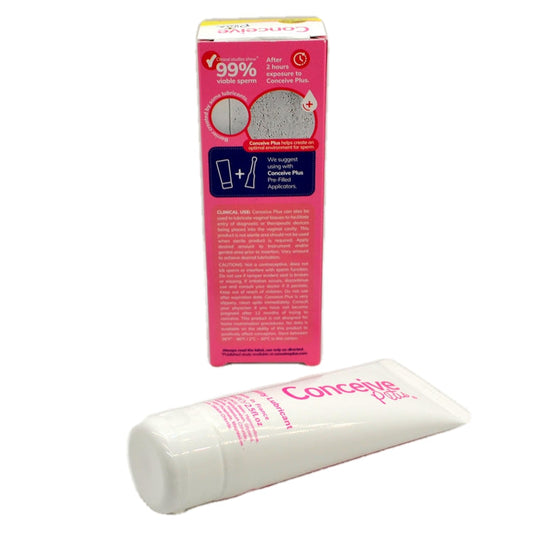Collection: Fertility Lubricant
-
Pre-Seed Spare Applicators Only (No Lubricant)
1 reviewRegular price £4.99Regular priceUnit price / per -
Pre-Seed Lubricant( expiry date December 2024)
Regular price £19.99Regular priceUnit price / per -
Pre-Seed + Lubido lubricant bundle ( Pre-Seed expiry date December 2024 )
Regular price £23.99Regular priceUnit price / per£27.99Sale price £23.99Sold out -
Pre-Seed + 25 Ovulation Test Strips (vial) Bundle
Regular price £24.99Regular priceUnit price / per -
Pre-Seed Fertility Friendly Lubricant multi-use 40g 9 wholesale
Regular price £1,270.50Regular priceUnit price / per -
Pre-Seed Lubricant 40g 9 applicator-Crushed Box SPECIAL OFFER
Regular price £15.99Regular priceUnit price / per£19.99Sale price £15.99Sold out -
Conceive Plus Fertility Lubricant 75ml Tube
Regular price £18.95Regular priceUnit price / per
Fertility and sperm friendly lubricant
Using a fertility friendly lubricant can help you to conceive. Fertility lubricants have been developed to mimic cervical mucus, to enhance your love making and to be sperm friendly, and have been clinically proven not to harm sperm.
Choose from the 2 popular fertility lubricant brands in UK
Fertility Lubricant
Fertility Lubricant Frequently Asked Questions
What is a fertility lubricant?
A fertility lubricant, also known as a fertility-friendly lubricant, is a type of personal lubricant designed specifically for couples who are trying to conceive. Traditional lubricants may contain ingredients that can be harmful to sperm or create an inhospitable environment for them. Fertility lubricants are formulated to be sperm-friendly and supportive of the natural reproductive process.
These lubricants typically have characteristics that mimic the fertile cervical mucus, which plays a crucial role in supporting the movement and survival of sperm in the female reproductive tract. Fertility lubricants are pH-balanced and often free from certain ingredients, such as parabens, glycerin, and other substances that might interfere with sperm motility.
Couples trying to conceive may choose to use fertility lubricants in place of their usual lubricant, to provide a more conducive environment for sperm while maintaining the comfort and lubrication associated with personal lubricants.
How do you use a fertility lubricant?
Fertility lubricants are designed to create an environment that is conducive to sperm survival and movement, providing couples with an additional option when trying to conceive. If you're considering using a fertility lubricant, here are some general guidelines on how to use it:
- Choose a Fertility-Friendly Lubricant:
Ensure that the lubricant you choose is specifically labeled as "fertility-friendly" or "sperm-friendly." Regular lubricants may contain ingredients that can be harmful to sperm. - Timing is important:
Use the fertility lubricant during your fertile window, which is the time in your menstrual cycle when you are most likely to conceive. This typically occurs just before and around the time of ovulation and just after ovulation, which is roughly in the middle of your menstrual cycle. - Follow the instructions:
Read and follow the instructions provided by the manufacturer on the packaging. Different fertility lubricant products may have specific usage guidelines, so it's important to adhere to them for the best results. - Apply the lubricant as directed:
Apply the fertility lubricant as directed on the packaging. Typically, you will apply it directly to the external genital area of either or both partners, or intravaginally using an applicator, depending on the brand of product. - Use a moderate amount:
Use a moderate amount of the fertility lubricant. Using too much lubricant may dilute the sperm concentration and hinder their movement. - Insertion methods:
If the lubricant is applied internally, use an applicator or follow the recommended insertion method. Some fertility lubricants are designed for both external and internal application. - Be mindful of other factors:
Consider other factors that may affect fertility, such as the use of other personal care products, diet, and lifestyle choices. Making healthy lifestyle choices can positively impact fertility. - Discontinue use if necessary:
While fertility lubricants have been designed to be non irritant if either partner experiences irritaion with the product it is best to discontinue use. - Know when to seek further help: If you have been actively trying to conceive for over 12 months, and have been using a fertility lubricant without success, consult with a doctor or healthcare professional for further advice. They can provide guidance and may recommend alternative approaches.
Remember that fertility can be influenced by various factors, and while fertility lubricants may offer assistance, they are not a guarantee of conception. If you have concerns about fertility or difficulty conceiving, it's advisable to consult with a healthcare provider for personalised advice and guidance.
Can a fertility lubricant help me get pregnant?
Fertility lubricants are specifically designed to create an environment that is supportive of sperm health and mobility. Traditional lubricants may contain ingredients that can be harmful to sperm, so fertility-friendly lubricants aim to address this issue. Here's how a fertility lubricant may help you get pregnant:
- Sperm viability:
Fertility lubricants are formulated to be sperm-friendly, meaning they do not contain substances that could impair sperm function or movement. They often mimic the consistency and pH of natural cervical mucus, which is essential for sperm survival and transport. - Maintaining pH balance:
The pH level of the vagina can influence sperm survival. Fertility lubricants are designed to maintain a pH level that is conducive to sperm viability, creating an environment that supports their journey through the reproductive tract. - Improved Motility:
Sperm need to swim through the cervix, uterus, and fallopian tubes to reach the egg for fertilization. Fertility lubricants aim to reduce friction and provide an optimal environment for sperm motility, allowing them to move more freely. - Enhanced lubrication:
Some couples may experience discomfort or dryness during intercourse, which can make conception more challenging. Fertility lubricants offer enhanced lubrication to address this issue, making intercourse more comfortable without compromising sperm health. A lot of women find orgasm much easier with a lubricant, and orgasm as well as increasing sexual pleasure may actually aid conception. - Timing of use:
Using a fertility lubricant during your fertile window, which is typically around the time of ovulation, can maximise its effectiveness. This is the period when the chances of sperm meeting the egg are highest. - Compatible with conception:
Fertility lubricants are often tested for compatibility with conception and should have undergone laboratory testing and clinical trials to ensure they do not negatively impact sperm function. Pre-Seed was developed by a sperm physiologist and is use by fertility clinics in USA.
It's important to note that while fertility lubricants can be a helpful aid for some couples, they may not be necessary for everyone. If you have plenty of natural lubrication and do not normally need a lubricant then you may not need to use one. For many couples though using a lubricant is an essential part of sex that enhances the experience for both partners.
If you have concerns about fertility or are experiencing difficulty conceiving, it's advisable to consult with a healthcare professional. They can provide a thorough evaluation, offer guidance on timing intercourse, and explore other potential factors influencing fertility. Additionally, they can recommend specific fertility lubricants if they believe it may be beneficial for your situation.

